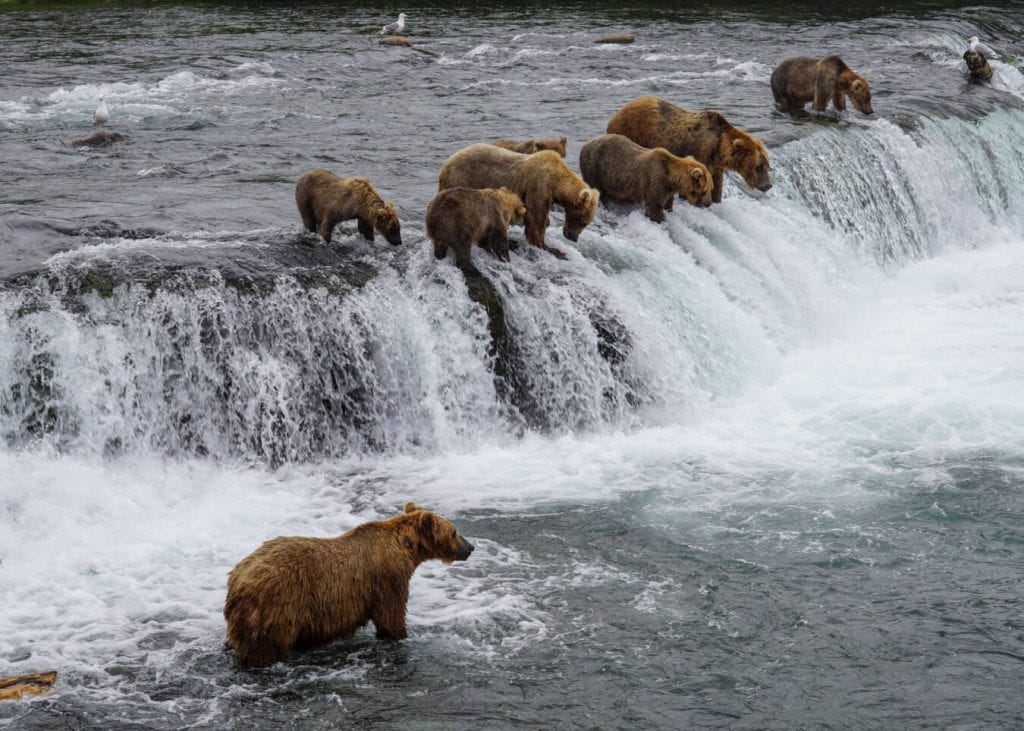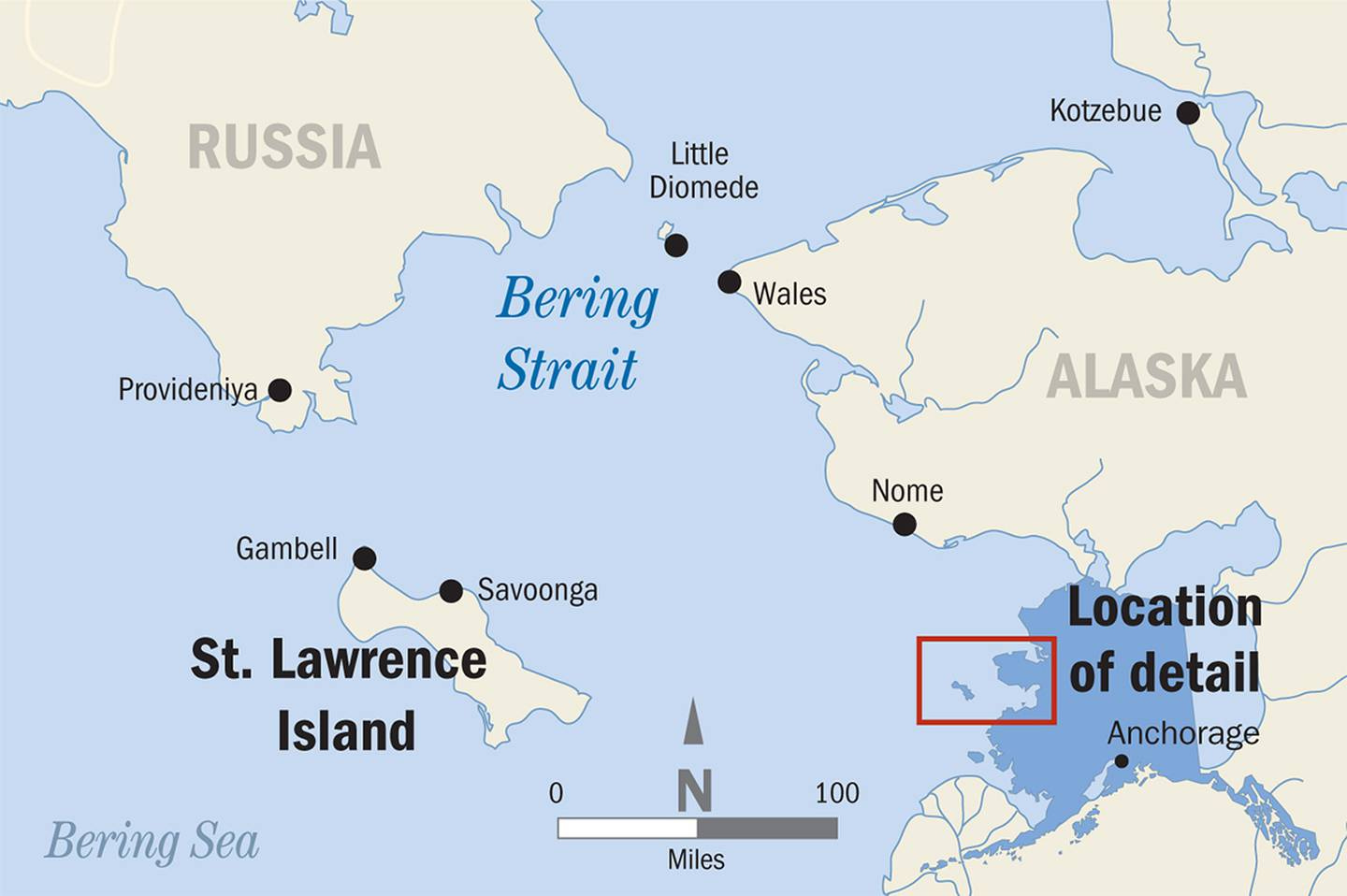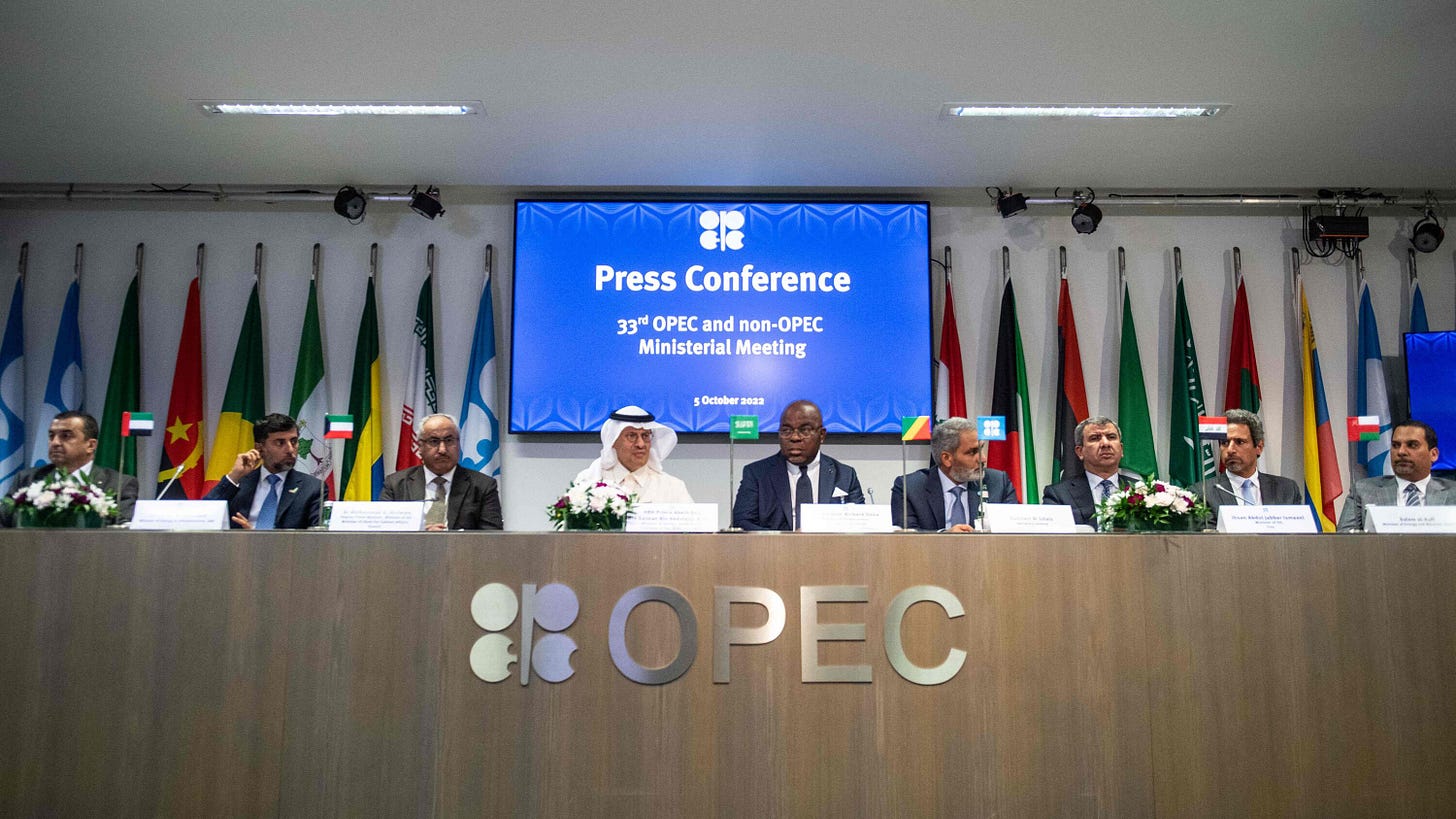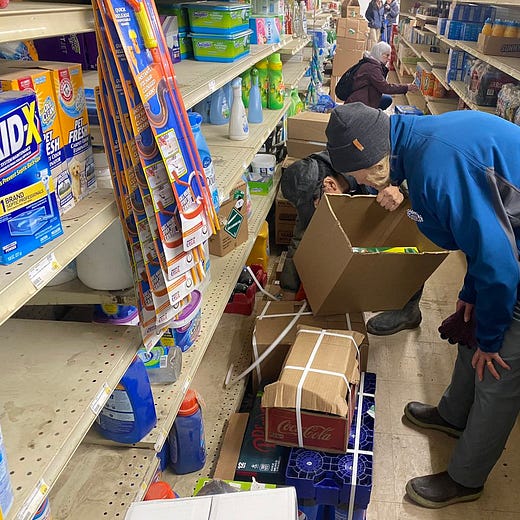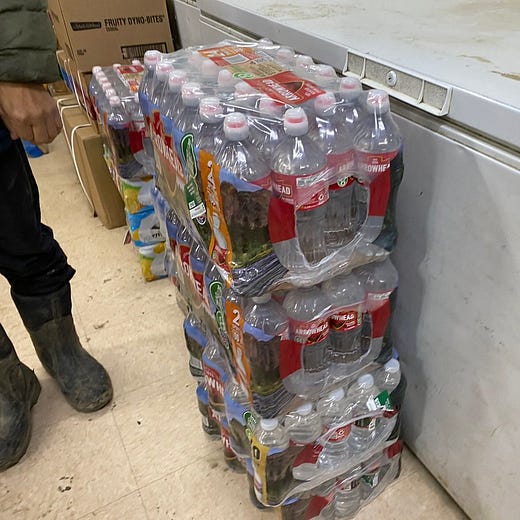Friday Flash Freeze
Peltola hires new staff, the Delegation responds to OPEC, Russian nationals arrive in Alaska
Hello and happy Friday, loyal readers of THE DELEGATION!
This was the first full week that both chambers of Congress were out of session to allow members to hit the campaign trail ahead of the midterms. With 2/3 of the Alaska Congressional Delegation up for re-election next month, there's been no shortage of political and policy-related news. Keep reading to catch up on what you may have missed.
Peltola's team grows, with a focus on fish and constituent services
Congresswoman Mary Peltola has been no stranger to making waves lately. Less than a month into her congressional career, she's already introduced and passed a bill, toured Alaska with an Administration official, and re-introduced a hefty slate of the late Congressman Don Young's legislation. Last week, her staff hires made national headlines. "She respects diverse voices in her office. She really carries that Alaska spirit of bipartisanship," Alex Ortiz, her Chief of Staff who previously served in the same role for Congressman Don Young, told Roll Call. Her pragmatic hiring decisions didn't stop with bringing former Don Young staffers aboard.
This week, she continued assembling her team of Democrats, Republicans, and independents. In a news release, Peltola announced three hires:
Sam Hiratsuka will serve as Peltola's Legislative Assistant for Native Affairs and rural issues. Hiratsuka (Yup'ik, Aleut, Winnemem Wintu, and Navajo) was born and raised in Anchorage. He's not new to the Alaska Congressional Delegation either; most recently, he served as Legislative Correspondent for Senator Dan Sullivan. He'll be based in Washington, D.C., where he'll advise Congresswoman Peltola on policy matters relating to Indigenous affairs, natural disasters, housing, small business, fisheries, oceans, tourism, postal, and immigration policy. Peltola made fisheries management policy part of the national conversation. With fisheries in his legislative portfolio, Hiratsuka will be a key staffer for the Congresswoman.
Tyson Fick has been hired as a Special Assistant for fishing policy and in-state constituent services. Fick isn't a newcomer to Peltola world; he previously served as Peltola's Chief of Staff in the Alaska Legislature. Additionally, he served as Communications Director at the Alaska Seafood Marketing Institute and Executive Director at Alaska Bering Sea Crabbers. He'll be based in Juneau, which means Peltola will have staffers covering fisheries-related issues in both D.C. and Alaska. Her commitment to fisheries policy shouldn't be a surprise, "Fish" is the first word in her campaign slogan: "Fish, Family, & Freedom."
Logan Basner, born and raised in Palmer, will serve as the Congresswoman's Special Assistant focused on in-state constituent outreach. Basner is no stranger to Alaska politics. Most recently, he served as Chief of Staff to Alaska State Representative Tiffany Zulkosky. He also brings experience as Regional Navigator for the Alaska Federation of Natives' Navigator program. With a master's degree in public administration from the University of Alaska, Anchorage, Basner should be well-equipped to connect constituents with their sole member of the U.S. House.
Emily Larsen will join Peltola's Washington, D.C. office as a staff assistant. Staff assistants are truly the glue that keep many congressional offices running. They answer phones, manage interns, and coordinate tours and meetings — among countless other duties. Larsen is a recent graduate of American University, where she studied justice and law with a concentration in terrorism and security. She joins Peltola's office after interning with Senator Angus King (I-ME) and is currently working on a master's degree in terrorism and homeland security policy.
A well-staffed office is critical for ensuring constituents feel heard and engaged with their representative. Peltola's strategy of assembling a high-performing team with diverse political backgrounds and life experience isn't just good office policy; it's healthy for political discourse. Constituents like to know that they can call an office and speak with staffers who have experience across the political spectrum.
Russian nationals see Alaska from their house
On Thursday, two Russian nationals beached their boat on St. Lawrence Island in the Bering Sea. The Russians, who were spotted by a senior community member from the Bering Strait region, reported that they fled Russia in order to avoid compulsory military service. It's difficult to blame them — Putin's illegal war continues dragging on. Amid sustained heavy losses, he's issued a degree for routine conscription.
Senator Lisa Murkowski and Senator Dan Sullivan issued a joint press release addressing the matter. Murkowski raised the fact that only local and state officials were available to respond immediately to the Russian nationals, while Customs and Border Protection had to dispatch the Coast Guard from over 750 miles away. Murkowski and Sullivan have been long-time advocates for the establishment of the Ted Stevens Center for Arctic Security Studies, which is now operating on JBER. Both of their statements tied the arrival of Russian nationals in Alaska back to the need for a stronger security presence in the Arctic.
What's obvious is that not even Russians want to fight Putin's war, and Senator Sullivan said as much in the news release:
"This incident makes two things clear: First, the Russian people don't want to fight Putin's war of aggression against Ukraine. Second, given Alaska's proximity to Russia, our state has a vital role to play in securing America's national security. This is why Senator Murkowski and I have been pressing officials in Washington D.C. so hard on the need to prioritize capabilities in the Arctic -- including infrastructure, Coast Guard assets, ports, and strategic defense assets."
This isn't a new phenomenon, but it comes at a time of increased tensions between the United States and Russia. Entering through Alaska is, however, somewhat unorthodox. The Associated Press reports that in August alone, Russian nationals were stopped for unlawful entry through Canada 42 times, up from 15 times in July. Russians have also attempted entry through Mexico, which does not require visas. Spikes in asylum attempts at asylum will likely continue as long as Putin wages war. As of Murkowski and Sullivan's release, federal officials are working to determine if the two Russian nationals qualify for asylum in the United States.
Murkowski calls for increased domestic energy production following OPEC's production cut
On Wednesday, the Organization of the Petroleum Exporting Countries (OPEC), led by Saudi Arabia and Russia, agreed to slash production by 2 million barrels daily. This represents the biggest cut in oil production since the COVID-19 pandemic began. OPEC's move to cut production earned them criticism from around the globe and across the political spectrum. President Joe Biden's National Security Advisor, Jake Sullivan, and National Economic Council Director Brian Deese issued a joint statement critical of OPEC, citing President Biden's disappointment in what he calls a "shortsighted decision."
Alaska, of course, is a prominent oil-producing state. Following OPEC's announcement, Senator Lisa Murkowski had harsh words for OPEC member states. "The members of OPEC+ clearly have little regard for the consequences of their actions. While higher oil prices may be good for their coffers for a time, they will harm families and businesses around the world," Murkowski said. "Even if this agreement is predicated on a global recession, their actions today will only contribute to it." Murkowski's statement made her position clear that the U.S. must fill the void with increased domestic production.
Murkowski, a member of the Senate Energy and Natural Resources Committee, wasn't alone in calling for increased domestic production. Her Alaska Delegation colleagues, Senator Dan Sullivan and Congresswoman Mary Peltola, took to social media to address the matter.
Sullivan's statement was more pointed, criticizing President Biden for easing sanctions on Venezuela to allow Chevron to resume oil production in the South American country.
Fiber broadband expands to seven Tribal communities
On Thursday, Calista Corporation and Alaska Communications announced that 2,300 Alaskans in seven rural communities along the Kuskokwim River would benefit from a tribal broadband grant funded by the National Telecommunications and Information Administration (NTIA). The communities include Lower Kalskag, Upper Kalskag, Tuluksak, Akiak, Akiachak, Kwethluk, and Napakiak. The digital divide in Alaska is stark and was made even more painful by the COVID-19 pandemic as education, commerce, and community functions went virtual.
The Bipartisan Infrastructure Law, supported by Senators Murkowski and Sullivan, in addition to the late Congressman Young, added $1 billion to the Tribal Broadband Connectivity Program. The project is part of the Alaska FiberOptic Project, a collaboration between Calista Corporation, Doyon, Limited, Gana-A 'Yoo Limited, Tanana Chiefs Conference, and Alaska Communications. The Alaska FiberOptic Project's vision is to connect up to 20 communities along the Yukon and Kuskokwim Rivers with fiber-optic cable.
The Alaska Congressional Delegation applauded the broadband expansion:
"Alaska's geography, terrain, climate, and vast size have created significant obstacles to developing broadband infrastructure. But rural Alaska is no less deserving of connectivity. For the first time, some of Alaska's most underserved communities will receive high-speed internet access made possible by the Tribal Broadband Connectivity Grant program," said Senator Lisa Murkowski.
"While Alaska villagers work hard at preserving their culture and traditions, they also need reliable, high-speed internet service to manage in today's world. It's essential to conduct business, keep in touch with family, receive medical care and communicate with public agencies. High-speed internet to these underserved communities is the perfect mix of new and old," said Congresswoman Mary Peltola
Senator Sullivan added, "I’m glad to see the significant federal infrastructure dollars we secured being deployed to break down the digital divide and improve the lives and well-being of thousands of Alaskans across the Lower Kuskokwim region.”
Once completed, Alaska Communications will also offer a $75/month discount for households on qualifying Tribal lands through the Affordable Connectivity Program. Alaskans are encouraged to learn more at: acpbenefit.org.
Social corner
Take a moment to catch up on what the Alaska Congressional Delegation has been saying on social media.


